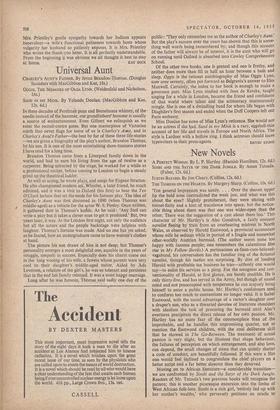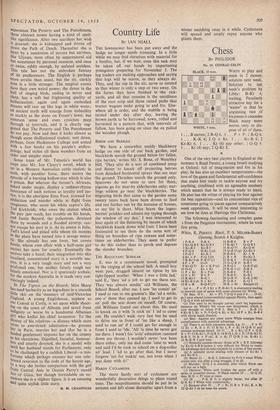New Novels
JUSTIN BAYARD. By Jon Cleary. (Collins, 12s. 6d.) THE TIGRESS ON THE HEARTH. By Margery Sharp. (Collins, 10s. 6d.)
'Ten general impression was sandy. . . . Over the shaven upper lip the bold nose contradicted the weak jaw, and what was this about the eyes? Slightly protuberant, they were staring with tunnel-fixity and a hint of truculence into space; but the notice- able thing about them was that one was wider-open than the other. There was the suggestion of a cast about them too.' This character of Mr. Hartley's is Alec Goodrich, a fairly eminent novelist fleeing by train from an overbearing mistress in North Wales, as observed by Harold Eastwood, a provincial accountant whose wife he seduces while in pursuit of a fragile and somewhat other-worldly Austrian barmaid. (The author seems none too happy with famous people; one 'remembers the calamitous film star in My Fellow Devils.) A pertinacious ex-faun-cum-beloved- vagabond, his conversation has the familiar ring of the fictional novelist, though his tactics are surprising. By dint of loading Harold with profitable tax business' he tries—artlessly one would say—to enlist his services as a pimp. For the smugness and con- ventionality of Harold, at first glance, are barely credible. He is only thirty-five, and has served in the Army, but though of sound mind and not preoccupied with temperance he can scarcely bring himself to enter a public house. Mr. Hartley's conformers tend to conform too much to conventions no longer valid. It is Isabel Eastwood, with the social advantage of a rector's daughter over a draper's son, who as a thwarted devotee of literature shoulders with idealism the task of procuring the barmaid until Alec's overtures precipitate the direct release of her own passion. Mr. Hartley has no more fear of the commonplace than of the improbable, and he handles, this unpromising quartet, not to mention the Eastwood children, with the cool deliberate skill that he showed in The Go-Between. The treatment of actual passion is very slight, but the illusions that shape behaviour, the failures of perception on which estrangement, and also love, can depend, the small changes of stress that can quietly shatter a code of conduct, are beautifully followed. If this were a film one would feel inclined to congratulate the chief players on a better script and a far better director than they deserved.
Moving on to African literature—a considerable transition— we are confronted by Simbi and the Satyr of the Dark Jungle. Readers of Mr. Tutuola's two previous books will recognise the pattern; this is another picaresque excursion into the limbo of West African folk-lore. Simbi is a rich girl, 'entirely fed up with her mother's wealths,' who perversely petitions an oracle to experience The Poverty and The Punishment, these abstract nouns having a kind of spell- like significance. After two sacrifices her wish is granted; she is kidnapped and driven off down the Path of Death. Thereafter she is beset by a succession of terrors but survives, like Ulysses, most often by supernatural aid but sometimes by personal resource, and once or twice, oddly enough, by unfated accident. This tale 4has not the unbroken fantasy of its predecessors. The English is perhaps More erratic than usual, but the sly, clerkly note is a little stronger. The magical events have their own weird power; the dance in the hall of singing birds, ending in terror and sleep, has a soft but frightening quality of hallucination; again and again embodied dreams will rear up like logs in white water; an ancient myth will emerge from imbecility as starkly as the stone on Fraser's lawn; but common sense and even cynicism peep through at intervals, and it is clearly sug- gested that The Poverty and The Punishment do not pay. Now and then it looks almost as though some disillusioned student, sent down, Perhaps, from Hashimoto College and armed tkith a few books on his people's anthro- pology, had stolen all these wonders from an older and simpler mind.
Some trace of Mr. Tutuola's world has crept into Mr. Jon Cleary's novel, which is set in a Western Australian cattle station; in each, with peculiar force, there occurs the episode of a burning hollow-tree which is also a prison. But whereas the former's Africans, naked under magic, display a ruthless-rhyme innocence of such notions as loyalty and jus- tice, it is the aborigine Emu Foot, arrested for abduction and murder while in flight from vengeance, who saves his white captor's life. Tad Kirkbride, who owns the station which the pair just reach, has trouble on his hands, and Justin Bayard, the policeman, detained there by wounds and a flooded airstrip, can- not escape his part in it. At its centre is Julie, Tad's loved and pitied wife whom six months in the place have turned into a savage neuro- tic. She already has one lover, but covets Justin, whose own affair with a half-caste girl excites her taste for cruelty. Eventually the natives take a hand; their integration into this localised, concentrated story is a notable suc- cess. It is a very tough story and not a very Profound one, but neither falsely tough nor falsely emotional. Nor is it spuriously archaic, for the modern Australia in it.reads very con vincingly indeed.
, In The Tigress on the Hearth, Miss Sharp has used barbarity as an ingredient in a smooth little skit on the 'manners of mid-Victorian Pngland. A young Englishman, nephew to our Consul at Corfu, is set upon while shoot- ing on the coast of Albania and saved from indignity or worse by a handsome Albanian girl who knifes his chief tormentor. To "the dismay of his relatives—a dismay which soon turns to awe-struck admiration—he grooms her in Paris, marries her and (for he is a landed gentleman) imposes her on the county as his chatelaine. Dignified, forceful, humour- less and utterly devoted, she is a model wife Until her husband stands for Parliament, only to be challenged by a caddish Liberal—a Mis- fortune which perhaps excuses her one cele-
brated reversion to the code of the heroic age. In a way she invites comparison with the girl
sea Central Asia in Dennis Parry's recent 'ea of Glass, but though formidable on oc- casions she is a slighter figure. It is an amusing 411d quite stylish little story.
H. M. CHAMPNESS











































 Previous page
Previous page